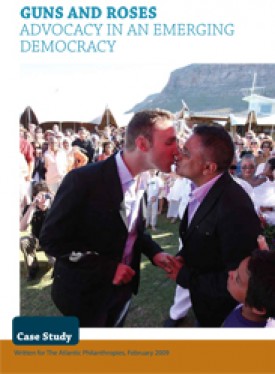Guns and Roses: Advocacy in an Emerging Democracy
Resource type: Case Study
The Atlantic Philanthropies |
This publication is an attempt to distil the learnings from three important books that were published during 2009 and which provide valuable insights into doing advocacy in an emerging constitutional democracy in South Africa.
Written by Marian Nell & Janet Shapiro for The Atlantic Philanthropies
Introduction
Advocacy, or the active support of a cause, idea or policy, is as old as the story of humankind. To hold a position or belief and to argue for it is as much a part of us, as the ability to speak and express an opinion. Using advocacy as a non-violent strategy to bring about social change is an integral part of a constitutional democracy. The Constitution was adopted to “lay the foundations for a democratic and open society in which government is based on the will of the people and every citizen is equally protected by law” and to “improve the quality of life of all citizens and free the potential of each person”. The years since 1994 in South Africa have shown that the Constitution provides a basis for the realisation of human rights but also that citizens need to fight for each step along the way to move from rights to realisation. When apartheid went, the struggle was not over.
In this publication we aim to show how, in two particular instances, advocacy has been effectively used in South Africa in the post-1994 period, to bring the rights enshrined in our Constitution closer to reality. There is no “best way” to do advocacy, other than to learn from the struggles of others and build on their learnings. This publication draws on three others:
- To have and to hold: The making of same-sex marriage in South Africa, edited by Melanie Judge, Anthony Manion and Shaun de Waal, Fanele, 2008
- A nation without guns? The story of Gun Free South Africa by Adèle Kirsten, University of KwaZulu–Natal Press, 2008
- A strategic evaluation of public interest litigation in South Africa by Gilbert Marcus and Steven Budlender, The Atlantic Philanthropies, 2008
We have had permission to draw on all these publications. The first two tell fascinating stories of how ordinary citizens were involved in making our Constitution a living document. The third, while it focuses on public interest litigation, draws invaluable lessons from an overview of the way in which advocacy is most successfully pursued to achieve lasting social change.
Acknowledgements
This publication is based on the insights, and often the words, of the three publications acknowledged above. The idea of the publication arose from an appreciation of the richness and value of these publications and a desire to make some of the insights in them accessible to more people. We hope we have done them justice. In addition, Fikile Vilakazi, Melanie Judge and Adèle Kirsten all made time to speak and communicate with us while we were writing the publication in order to clarify or elaborate on certain issues. For this we are very grateful.
In Summary
This publication is an attempt to distil the learnings from three important books that were published during 2009 and which provide valuable insights into doing advocacy in an emerging constitutional democracy. After looking briefly at the constitutional basis for this advocacy work, we give some background to the two campaigns highlighted in our publication: the Gun Free South Africa (GFSA) campaign to reduce the number of firearms circulating in our society, and the campaign for the recognition of same-sex marriage conducted around the Civil Union Act by organisations from the organised lesbian, gay, bisexual, transgender and intersex (LGBTI) sector. The campaigns were very different in terms of the issues they addressed. While there are strongly held beliefs about gun-ownership, the same-sex marriage issue went to the heart of beliefs and culture and a perceived clash between the secular and sacred. Nevertheless, the structures of the campaigns were not that different and they highlight core challenges that advocacy campaigns in a constitutional democracy such as South Africa face. Using all three of the source publications, we attempt to put together a framework for successful advocacy in this situation, discussing each of the two campaigns under the headings of:
- Clarification of the issue and defining the goals
- Researching the issue and understanding the context
- Building strategic partnerships
- Mobilising specific constituencies and communities
- Working with the media
- Lobbying
- Working through the parliamentary process
- The struggle continues.
While condensing the rich experience of the two campaigns inevitably means that some of the detail and insights are lost, we have tried, wherever possible, to quote from the sources and use their insights. Anyone interested in doing advocacy work in a constitutional democracy would do well to go back to all three of the source publications.
Our conclusions in the final section are our own and are an attempt to build on the learnings of the authors and writers, while suggesting, based on their insights, how the framework could be extended to some degree.
Marian Nell
Janet Shapiro
